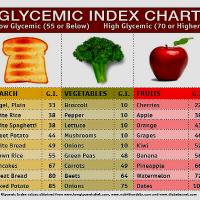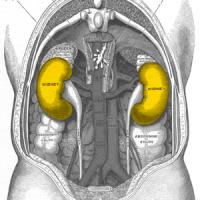Low Carb Dieting & Intestinal Health
 Low Carbing and Intestinal Health
Low Carbing and Intestinal Health
Constipation and diarrhea happen to everybody at one time or another. Changes in the diet and eating habits, food choices, stress, illness, medications .. these all affect the digestive process. Some low carbers experience diarrhea in the early days of Induction, as their bodies get rid of excess carbohydrates, and ketone production begins. Then constipation becomes a problem, not because of low carbing per se, but from lack of fiber. Whole grains, legumes and fruits, are the usual sources of dietary fiber, but of course these foods are restricted during the early phases of a controlled-carb program.
Some general suggestions for overall bowel health and regularity include
- eat a variety of foods, including low carb high-fiber vegetables, leafy greens and salads
- drink lots of water
- get regular exercise
CONSTIPATION
It's been said some folks take a week or more for the "first" movement, after switching to low carb. If your previous diet was full of highly processed and refined sugary starch carbs, changing to eating more meats and low-starch vegetables will take a bit of adjustment. Once you do "go", things will return to a regular pattern. The constipation problem may be from a combination of things. Definitely more fiber from vegetables and whole fruits, if allowed, and/or a fiber suppelement such as psyllium or ground fresh flax seeds will be helpful. Also, drink more WATER.
Chronic constipation can be a symptom of low thyroid. Whether or not there's adequate fiber and bulk in the diet, this can cause slowed metabolism and a sluggish bowel. What happens then is that water gets reabsorbed from the colon, and things become, um .. hard as a rock. Check with your health care provider if you think low thyroid might be a problem for you.
Many medications, both prescription and over-the-counter can cause constipation as a side-effect. Most notorious are pain-killers, especially codeine and other opiates, as well as antidepressants, iron pills and diuretics. Some calcium carbonate supplements can be constipating as well.
Laxatives are not an ideal solution, perhaps for occasional use only. Even the "natural herbal" types, senna leaf and cascara sagrada can be habit-forming. What they do is irritate the bowel, causing it to "spasm" ... and the spasm is what stimulates the bowel to move. However, it would do no harm to add a stool softener such as Docusate (Colace) ... it's not absorbed at all; it helps the stool hold onto water, and is not habit-formimg. It's important to remember that it's NOT a laxative; you still need to ensure adequate fiber and water intake. Docusate (Colace) is very safe to use, but read and follow the directions and precautions on the package carefully.
Some other suggestions -
- Drink plenty of water and other carb-free fluids. This will help to keep the bowel contents moist.
- Take a fiber supplement such as sugar-free Metamucil, or plain psyllium husks, which you can buy in bulk at a health food store. Psyllium absorbs a great deal of water, thus adds bulk to the bowel contents. Warning - definitely drink lots of water with this, to prevent it from turning to cement! Also, do not take psyllium at the same time as other medications or supplements .... the high-fiber will inhibit the absorption of other pills.
- Exercise. Keep the whole body moving, this will get the bowel moving!
- Try this yoga exercise ... stand tall, shoulders back ...breathe in deeply, then out ... 2 or 3 times. When the last breath is OUT, hold your breath, then suck in your gut and quickly push it out again. No kidding! Do this several times in quick movements while still holding your breath --- the rhythmic abdominal "ripples" will help to stimulate peristalsis, the bowel motion. Take a few more "cleansing" breaths, and repeat.
- Are you consuming enough fats and oils? You do indeed need to ensure an adequate intake of fat ... olive and flax oil are good, add a Tbsp of either of these to the dressing you put on your salads. These will help prevent things from turning into a hard, dry rock!
- Add some variety to the vegetables you're eating. If the salads you eat are composed mainly of the pale iceberg lettuce, it's full of water, and not a lot else. Choose dark green lettuces, romaine, endive and raw spinach especially is amazing for it's ability to get things moving. Have a serving of lightly steamed, high fiber veg. such as broccoli,asparagus .... or spinach!
- Cut out ALL salt for a couple days. So no ham, bacon, or bottled salad dressing, mayo, mustard, pickles or diet soda pop (soda = sodium). This will help get rid of fluid retention and bloat ... sometimes the abdominal bloat itself creates pressure which slows the bowel.
- Try a cup of hot (but not boiling) water with the juice of half a lemon -- use fresh lemon juice, not the bottled type, which has sodium citrate in it. Drink this first thing in the morning, and again late afternoon, if no result. (The lemon juice does have a few carbs (2.5), but in this case, they're important)
DIARRHEA
Transient diarrhea is not unusual for a few days, maybe a week, right at the beginning of Induction. This happens as your body rids itself of excess carbs, and the fat-burning process of ketosis begins. But it should settle down.
Is this new way of eating (WOE) a radical change for you? If you're used to eating a lot of highly processed white food - white bread, white rice, white sugar, white flour, rice krispies, bagels, donuts, chips and the like - it may take your intestinal tract a few weeks to adjust to the new and improved diet consisting of REAL food, meats, vegetables and salads.
Are you eating any of the low carb protein bars, or maybe having a few "sugar free" candies or chocolate bars? These things are sweetened with glycerine, sorbitol or maltitol (or some other sugar alcohol). These sweeteners are not completely absorbed from the small intestine, and are notorious for causing diarrhea, gas, etc.
Are you eating a lot of homemade low carb desserts and treats, like cheesecakes, chocolates and artificially sweetened whipped cream things?? The artificial sweeteners that you buy to use at home contain maltodextrin, which helps give it bulk, and makes it look and and measure just like regular sugar. While the sweetener itself doesn't cause any problem, this dextrin (made from corn usually) can. So go easy. Note that the maltodextrin is NOT added to artificially sweetened soft drinks, drink powders or diet gelatin.
Some suggestions -
- If it's just a matter that the stools are loose or a bit watery when you do go, this is not a real problem, and should correct itself in time. Try taking a small dose of sugar-free Metamucil or plain psyllium husks (you can buy these cheaply at a health food store) before meals. This stuff isn't just for constipation!! The fiber will absorb the excess water in the stool, helping to bulk and firm things up a bit.
- If you're not used to eating raw vegetables, and are now eating salads every day, that could be a bit of a problem. Try using lightly steamed vegetables, chilled and served with a vinaigrette for now. Another thing might be to make sure you are chewing the raw veggies thoroughly. Sometimes there's a tendency to stuff a mouthful of lettuce in, then wash it down with a big swig of water. That's hard on the gut if it's not used to it. If you think this might be the culprit, and there's also a bit of gas problem, you might consider using Beano for a few weeks, until your system adjusts.
- If your diarrhea is accompanied by a lot of gas, bloated abdomen, cramps and urgency, this is a sign of some food intolerance. You need to be a sleuth to find out what it is. It could be something obvious, like a vegetable you've never had before, or it could be a food additive, like an artificial sweetener or the citric acid in diet soda pop.
- If you've been eating lowFAT - highCARB for ages, and now are eating low carb but a lot more FAT than you've been used to, this could cause loose stools, but it's transient, and will disappear as your body adjusts.
- Some medications can cause diarrhea as a side effect. These include antibiotics, some heart and blood pressure medications, antacids, magnesium supplements. The diarrhea and bowel distress caused by antibiotics can be helped by taking acidophilus supplements .... just be sure not to take at the same time as the antibiotic dose.
- If you are suffering abdominal distress including diarrhea, and also fever, headaches and fatigue, this is a sign of infection. Get thee to the doctor at once.
IRRITABLE BOWEL (IBS)
Irritable Bowel Syndrome (IBS) is a common disorder of the intestines that leads to crampy pain, gassiness, bloating, and changes in bowel habits. Some people with IBS have constipation, others have diarrhea, and some people experience both. Sometimes the person with IBS has a crampy urge to move the bowels but cannot do so. IBS, however, is not caused by inflammation and should not be confused with another disorder, ulcerative colitis.
The cause of IBS is not known, and as yet there is no cure. Doctors call it a functional disorder because there is no sign of disease when the colon is examined. IBS causes a great deal of discomfort and distress, but it does not cause permanent harm to the intestines and does not lead to a serious disease such as colitis, Crohn's or cancer. Often IBS is just a mild annoyance, but for some people it can be disabling. They may be unable to go to social events, to go out to a job, or to travel even short distances. Most people with IBS, however, are able to control their symptoms through medications prescribed by their physicians, diet, and stress management.
RESOURCES
FocusOnDigestion.com - a member site of MedicineNet.com is excellent, dealing with all aspects of digestive health.
- Constipation information, links
- Diarrhea information, links
- Irritable Bowel (IBS) information, links, related conditions
Happy Low Carbing!
-
Methods To Succeed With Low Carb Diets - What You Need To Do
Low carb diets are incredibly popular at this time, and many individ
-
Today's popular searches:
Fac
-
9 Useful Tips to Choose a Low Carb Diet
In this article we have discussed how to choose a low carb
-
Checking Out Diet Reviews Ror Diet Planning
When you are planning to make changes in your diet for whatsoever rea
-
Low Carb Veggie Shiratake Noodle Stir-fry
Weight Loss In San Diego - A special Recipe... LOW CARB Veggie Shir
-
Low Carb Breads
Her
- DON'T MISS
- Emotions and Low-Carb Diets
- A Low Carb Vegetarian Diet Might Be Just Right for You
- A Low Carb Diet Worked For Me
- Weight Loss: High Protein Diet Vs Low Fat Diet - Which Is Better?
- Low Sugar
- Dont Be Confused About Low Carb Diets - 7 Key Points Explained
- Getting The Best Results From Low Carb Diets
- Low Carb Recipe Can Be Fun
- Low Carb Diet Plans
- Creating a High Protein, Low Carb Diet Plan




